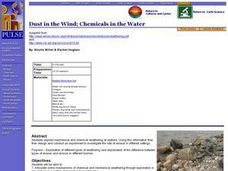Chicago Botanic Garden
Carbon, Greenhouse Gases, and Climate
Climate models mathematically represent the interactions of the atmosphere, oceans, land, sun, surface, and ice. Part two in the series of four lessons looks at the role greenhouse gases play in keeping Earth warm and has participants...
Curated OER
Dust in the Wind; Chemicals in the Water
Students explore mechanical and chemical weathering at stations. They articulate some mechanisms of chemical and mechanical weathering through exploration in a lab. Students stations describe how chemical weathering differs from...
Curated OER
Geo Sequestration Lab
High schoolers explore geologic sequestration as a technique used to reduce carbon dioxide in the atmosphere. They use chemistry to stimulate oil mining. Students conduct an experiment to learn about geo carbon sequestration.
Curated OER
Losing An Island
Students examine carbon dioxide and determine the impact of greenhouse gases on the earths spheres. In this pollution lesson students complete a lab activity to see the impact of gases on the environment,
Curated OER
It Looks Like Champagne
Students determine some practical implications of the discovery of liquid carbon dioxide in deep-ocean ecosystems. They interpret phase diagrams and explain the meaning of "critical point" and "triple point."
Curated OER
Alka-Seltzer Cannons
The scientific method is emphasized in this engaging and exciting chemistry lesson. Learners get to create Alka-Seltzer cannons out of film cannisters, water, and Alka-Seltzer tablets. Carbon dioxide gas builds up inside the cannister,...
Curated OER
Mass-Mass Relationship
Learners investigate mass-mass relationships in the lab. In this mass-mass relationship lesson plan, students mix sodium carbonate with hydrochloric acid to produce sodium chloride, water and carbon dioxide. Learners use the amount of...
Curated OER
Chemistry In Plant Nutrition And Growth
Pupils investigate different factors that affect plant growth. They research the effects of water supply, radiant energy, air temperature, and soil temperature. Students also gather facts that influence plant nutrition that include the...
Curated OER
Activity #14 Floating Bubbles
Learners comprehend that Carbon dioxide gas is relatively easy to generate. They comprehend that one way to produce it is with dry ice. Pupils comprehend that carbon dioxide gas can also be produced by combining baking soda with vinegar.
Curated OER
Ziplock Chemistry
Students investigate various chemical reactions when creating mixtures in ziplock baggies. In this chemistry lesson, students will recognize various chemical reactions and cite evidence. Safety and assessment strategies are included in...
Curated OER
Devising a Set of Experiments to Test Water for Dissolved Substances
Students work together to test water samples for pollutants. They design data tables to collect and record their observations. They complete discussion questions to end the lesson.
Curated OER
The Nature of Chemical Change: Acting Out an Example
Students identify the signs that a chemical reaction took place. In this chemistry lesson, students role play the movement of different molecules of matter. They classify matter according to their properties.
Curated OER
Oceanic Absorption- Oceanic Sequestration
Students examine the techniques that may be used to reduce carbon dioxide in the atmosphere. In this pollution lesson plan students simulate oceanic sequestration using chemistry.
Curated OER
Alka-Seltzer Cannons
Fourth graders observe what is happening when an Alka-Seltzer tablet is placed in a clear cup of water. They observe the release of carbon dioxide gas. Pupils answer the question of how much as is released by observing the experiment...
Curated OER
Nonmetals
Learners research about the chemical processes involved in cave formation. In this chemistry lesson, students draw or find a cave picture with stalagmites and stalactites online. They write a brief caption and share them with the class.
Curated OER
Global Change — Change and Cycles Where Land, Air and Water Meet
Students participate in an experiment to define a parts-per-billion solution. For this ecology lesson, students select a second substance to create a parts-per-billion solution and observe and record their results. Students work in...
American Chemical Society
Production of a Gas - Controlling a Chemical Reaction
Though the publisher designated this unit for use with third through eighth grades, this particular lesson would be best used with middle schoolers due to the specific measurement skills required. Basically, they set up the reaction...
Curated OER
Combustion Reactions
Students write a balanced chemical reaction. They articulate how burning fossil fuels increase the carbon dioxide levels in the atmosphere. Students incorporate all the environmental risks involved as well.
Curated OER
Ocean Absorption Lab
Students examine various techniques that can reduce carbon dioxide in the atmosphere, and use chemistry to simulate oceanic sequestration. They conduct an experiment involving the method of oceanic absorption for carbon sequestration,...
Curated OER
Chemical Consequences of Burning Fossil Fuels
Future scientists are introduced to the chemical consequences of burning fossil fuels, learning that fossil fuel combustion leads to the formation of oxides of three nonmetals: carbon, nitrogen, and sulfur, all of which end up in the...
Curated OER
Off Base
Students study La Chatelier's principle and identify how carbon dioxide may affect pH. In this coral lesson students complete a worksheet on pH and observe a lab.
Curated OER
Cool Chemistry- DIY pH Indicator
Students study the differences between an acid and a base. In this pH lesson students view a demonstration then test chemicals in groups.
Curated OER
Teaching about the Chemistry of Oxygen Solubility
Students explore solubility of gases in water, Henry's Law, LeChatelier's Principal, and supersaturation of gases in water.
Curated OER
Measuring Quantities of Gases Activity
Learners use a pipette to mix small amounts of food coloring into water. They visualize the small quantities of parts per million and parts per billion. Contrary to the title, the lesson is about liquid amounts rather than gas amounts....

























